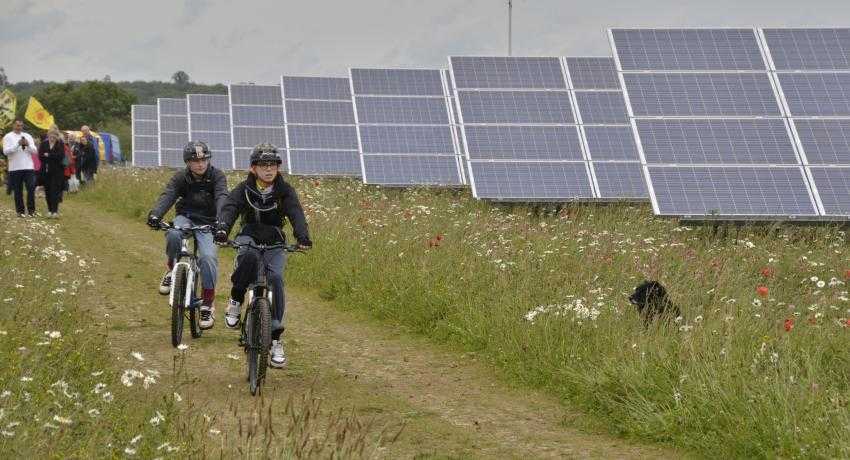Solar gardens are a hot topic as Colorado heads into Spring
Solar gardens are an increasingly popular way to allow people to own solar when they otherwise couldn’t for various reasons. However, solar gardens are still nascent, and in many places, like Colorado, the rules and laws behind are still being developed.
Last year, Colorado passed the Community Solar Garden bill (HB 10-1342), which was signed into law by Gov. Bill Ritter (D).
On March 7, the Sierra Club hosted a packed Solar Gardens Forum at the University of Colorado at Boulder. The informational forum was held as Colorado’s Public Utilities Commission finalizes its solar garden rules and requirements for investor-owned utilities and for potential participants.
Solar gardens are owned by participating community members, who agree to buy a part of the array, like a photovoltaic module. In Colorado, the law stipulates that at least 10 people have to buy into the project. But much of the rest of it is left up to the utility and the community.
By offering people a chance to buy just a portion of a solar array, it opens the prospect of solar ownership up to more people, said Greg Ching, with the Solar Garden Institute.
“One of the things I think is critical to solar gardens is the notion of justice,” he said. “All along, poor people contributed 2 percent of their utility money [to Xcel’s clean energy fund].”
That money along with the 2 percent contributed by Xcel’s other customers is distributed in form of rebates through the solar rewards program, which generally benefits better-off Xcel customers that can afford the other costs of solar.
“That’s great, but at the same time, it brings forth some inequity, some unfairness,” said Ching. “Why are poor people helping subsidize generally wealthy people? In the current draft rules, there’s 5 percent set aside to help encourage low-income participation.”
“We’re really making this up as we go along,” said bill sponsor state Rep. Claire Levy (D). “People came to me with their issues and problems. All kinds of situations where people couldn’t have solar on their rooftops, maybe they were renters, shade trees, historic homes. And then people started talking about: ‘Couldn’t we get together on our cul-de-sac; couldn’t our homeowners association do this?’
“Developing the bill was a process of figuring out what kind of model would work to put it together,” Levy said. “And how can we make that fit within the existing structure for renewable energy that we have in Colorado.”
To allow for all of the contingencies, the bill was made as flexible as possible, said Xcel Managing Attorney Paula Connelly.
“We strove to have legislation that didn’t have any rules,” she said. Rather it created guidelines for the program.
For instance, projects can determine how much to charge for participation. What’s left for the utilities commission, however, is to determine rates for Xcel to pay for solar garden generation, rebates and more.
Counties and municipalities are in charge of determining how to implement other aspects, like zoning ordinances.
Boulder County Commissioner Will Toor explained that under the law, the county will look at developing solar garden zoning ordinances for 3 categories. Gardens under 500 kilowatts in size, those between 500 kWs and 2 megawatts, and larger gardens. Each will have their own set of rules he said.
“[Under 500 kW] would be allowed in all of the county zoning districts, with a relatively simple review process,” said Toor. “Above 500 kW would still be allowed in many zoning districts.” However, systems 500 kW and above would be considered on disturbed lands like old landfills and brownfields. Gardens over 2 megawatts would only be considered on commercial sites.
Though the final rules are not out yet, a general consensus among the panelists, who also included Simple Solar Director of Sales and Marketing Steve Bauhs and Boulder Regional Sustainability Director Jonathan Koehn, was that now is the time to start organizing bids for solar gardens.
Under the law, Xcel will only support 6 megawatts of solar gardens per year for the first three years, Connelly explained. Given that the utility is already clashing with the state’s solar industry over proposed rebate reductions, its rebate level in the future is still uncertain.
There are fears that solar gardens may exceed the utility’s capacity for such projects.
“One of my biggest concerns is that it’s not going to be enough. After three years, we’ll see if we can expand it,” Connelly said. “For solar gardens to take off in the state, we need your participation, we need you to get organized and get together [on these projects].”
Image courtesy of the University of Colorado Boulder’s environmental studies program.




